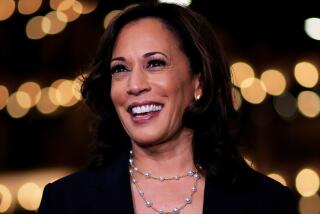Florida sets primary date, forcing shakeup of election calendar
- Share via
Florida made it official on Friday and set its presidential primary for Jan. 31, a decision already forcing changes for nominating contests in other states.
A panel of state leaders voted 7-2 to advance Florida’s primary despite last-minute efforts from the Republican National Committee to lobby the state to remain in compliance of party rules that say most states must wait until March.
Leaders argued that Florida voters deserve a chance to make an early statement in the presidential sweepstakes because of the state’s size, diversity and status as a general election battleground.
“We’re the biggest swing state in the union. Texas is red. New York is blue. California in blue,” former Gov. Bob Martinez, one of the panelists, argued.
Florida had initially planned to hold its primary in February. But other states have already planned contests in violation of RNC rules, established to preserve the traditional status of Iowa, New Hampshire, Nevada and South Carolina as the lead-off states. State parties must submit their delegate selection plans by Saturday.
When Florida’s decision was announced, New Hampshire Secretary of State Bill Gardner immediately moved up the filing period for his state’s primary to Oct. 17-28, a step he said in an interview Wednesday that he would take only if he thought the first-in-the-nation primary could be held in December 2011.
Matt Strawn, chairman of the Iowa Republican Party, slammed the “arrogance” of Florida’s leadership.
“The consequences of Florida’s intransigence must be swift and severe,” he said.
The date of the Iowa caucuses will be announced after New Hampshire sets the date of its primary, he added.
Any state that does not comply with GOP rules regarding their nominating contests faces the loss of half of its delegates to the national convention. That convention is being hosted in Tampa, Fla.
An RNC spokesman would not say yet what the consequences might be.
“While the primaries will now start earlier than planned, the overarching goal of the current rules was to allow more states and voters to have a role in choosing the next Republican nominee for president. This goal will be met,” Kirsten Kukowski said.
The most likely scenario is a schedule that mirrors the one in 2008, with Iowa’s caucuses on either the first Monday or Thursday of January and New Hampshire coming the following Tuesday.
But one issue looming that could force some states into December is Nevada Republicans’ intention to hold its caucuses on the Saturday after New Hampshire’s primary. New Hampshire state law requires a seven-day buffer between its contest and any “similar” election.
“That would be significant compared to anything [else] so far,” said Gardner, who has absolute authority to determine the date of New Hampshire’s primary.
Aaron Deslatte of the Orlando Sentinel contributed to this report.
More to Read
Get the L.A. Times Politics newsletter
Deeply reported insights into legislation, politics and policy from Sacramento, Washington and beyond. In your inbox twice per week.
You may occasionally receive promotional content from the Los Angeles Times.











